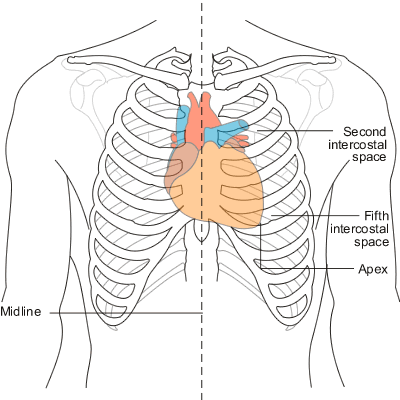Cardiology Teaching Package
A Beginners Guide to Normal Heart Function, Sinus Rhythm & Common Cardiac Arrhythmias
Chest Leads
There are 10 wires on an ECG machine that are connected to specific parts of the body. These wires break down into 2 groups:
- 6 chest leads
- 4 limb or peripheral leads (one of these is "neutral")
The 6 chest leads are positioned as below:
Image: Positioning of the 6 chest leads

The 6 leads are labelled as "V" leads and numbered V1 to V6. They are positioned in specific positions on the rib cage. To position then accurately it is important to be able to identify the "angle of Louis", or "sternal angle".
To find it on yourself, place your fingers gently at the base of your throat in a central position and move your fingers downward until you can feel the top of the sternum, or rib cage. From this position, continue to move your fingers downward until you feel a boney lump. This is the "angle of Louis".
The angle of Louis is most easily found when the patient is lying down as the surrounding tissue is tighter against the rib cage.
From the angle of Louis, move your fingers to the right and you will feel a gap between the ribs. This gap is the 2nd Intercostal space. From this position, run your fingers downward across the next rib, and the next one. The space you are in is the 4th intercostal space. Where this space meets the sternum is the position for V1.
Go back to the "angle of Louis" and move into the 2nd intercostal space on the left. Move down over the next 2 ribs and you have found the 4th intercostal space. Where this space meets the sternum is the position for V2.
From this position, slide your fingers downward over the next rib and you are in the 5th intercostal space . Now look at the chest and identify the left clavicle, a bone that runs from the left shoulder to the top of the sternum. The position for V4 is in the 5th intercostal space , in line with the middle of the clavicle (mid-clavicular). V3 sits midway between V2 and V4.
Follow the 5th intercostal space to the left until your fingers are immediately below the beginning of the axilla, or under-arm area. This is the position for V5.
Follow this line of the 5th intercostal space a little further until you are immediately below the centre point of the axilla, (mid-axilla). This is the position for V6.
Now look at the picture below showing the position of the heart in relation to the rib-cage and you get an idea as to which areas are being looked at by these leads.
Image: Heart position in relation to the rib cage

